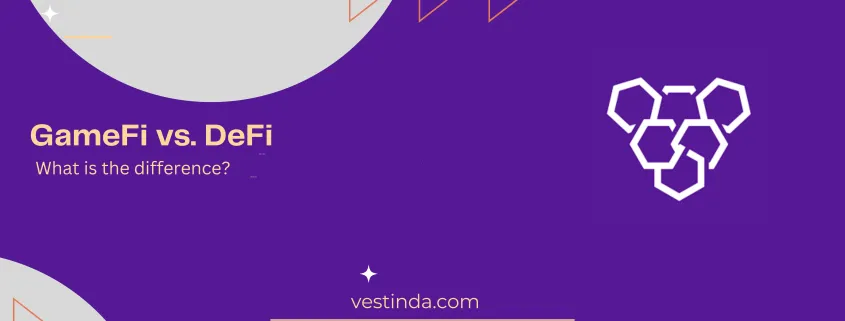In the ever-evolving landscape of cryptocurrency, two terms have been making waves: GameFi and DeFi. But what exactly sets them apart? Let’s dive in and unravel the mysteries behind these buzzworthy concepts.
When it comes to navigating the crypto sphere, understanding the nuances between GameFi and DeFi is crucial for investors looking to diversify their portfolios and optimize their crypto tracking and management. In this article, we’ll explore the fundamental differences between GameFi and DeFi, shedding light on their respective characteristics, use cases, and potential impact on the crypto market.
Additionally, we’ll delve into strategies for incorporating these trends into your crypto portfolio management approach, empowering you to make informed decisions in the dynamic world of digital assets. So, buckle up as we embark on this enlightening journey into the realms of GameFi and DeFi.
Article summary
What is GameFi?
GameFi, short for “Game Finance,” refers to a burgeoning sector within the cryptocurrency space that merges elements of gaming with decentralized finance (DeFi) principles. In GameFi, players can earn tokens by participating in various in-game activities, such as completing quests, battling opponents, or acquiring virtual assets. These tokens often hold real-world value and can be traded or used within the game’s ecosystem. GameFi platforms aim to incentivize user engagement, foster community-driven economies, and provide new revenue streams for gamers. By gamifying financial activities and incorporating blockchain technology, GameFi introduces innovative ways for players to interact with digital assets and offers opportunities for earning and investing in virtual worlds.
What is DeFi?
DeFi, short for “Decentralized Finance,” refers to a broad category of financial services and applications built on blockchain technology, primarily Ethereum. Unlike traditional finance, DeFi operates without intermediaries like banks or brokerages, relying instead on smart contracts to automate transactions and enforce agreements. DeFi encompasses various use cases, including lending, borrowing, trading, and asset management, all executed in a permissionless and transparent manner.
Participants in DeFi can access financial services globally, maintain control over their assets through private keys, and earn yields through activities like liquidity provision or staking. DeFi represents a paradigm shift in finance, offering greater accessibility, inclusivity, and innovation with the potential to revolutionize the global financial system.
Features of GameFi
- Innovative Gameplay Mechanics: GameFi introduces novel gameplay mechanics that incentivize player engagement and reward participation. These mechanics often involve play-to-earn models, where players can earn cryptocurrency or in-game assets by completing tasks, achieving milestones, or contributing to the game ecosystem.
- NFT Integration: Non-fungible tokens (NFTs) play a significant role in GameFi, enabling players to own, trade, and monetize in-game assets securely. NFTs represent unique digital items or collectibles, such as characters, weapons, or virtual real estate, providing players with true ownership and scarcity.
- Community Governance: GameFi projects often incorporate community governance mechanisms, allowing players to participate in decision-making processes related to the game’s development, updates, and economic policies. This fosters a sense of ownership and decentralization within the gaming ecosystem.
- Interoperability with DeFi: GameFi platforms leverage interoperability with decentralized finance (DeFi) protocols, enabling seamless integration of gaming assets with DeFi services such as liquidity provision, yield farming, and asset swapping. This interoperability expands the utility and liquidity of in-game assets beyond the gaming ecosystem.
- Cross-Platform Compatibility: GameFi games are designed to be compatible across multiple platforms, including web browsers, mobile devices, and gaming consoles. This accessibility allows players to engage with the game seamlessly across different devices and ecosystems, enhancing user adoption and engagement.
- Economic Sustainability: GameFi projects prioritize economic sustainability by designing balanced tokenomics, scarcity models, and reward structures that incentivize long-term player participation and ecosystem growth. This ensures the longevity and viability of the GameFi ecosystem while creating value for players and investors alike.
Features of DeFi
- Decentralization: DeFi operates on decentralized networks, removing the need for intermediaries like banks or financial institutions. Transactions occur directly between users through smart contracts, ensuring transparency, security, and censorship resistance.
- Open Access: DeFi platforms are open to anyone with an internet connection and compatible digital wallet, enabling global participation without the need for traditional banking infrastructure. This inclusivity empowers individuals worldwide to access financial services, regardless of their location or socioeconomic status.
- Permissionless Innovation: DeFi fosters a culture of permissionless innovation, allowing developers to create and deploy financial applications without seeking approval from centralized authorities. This promotes rapid experimentation and the development of diverse financial products and services.
- Interoperability: DeFi protocols are designed to be interoperable, enabling seamless integration and interaction between different decentralized applications (DApps) and financial services. This interoperability facilitates composability, where developers can combine existing protocols to create new, more complex financial solutions.
- Transparency: DeFi leverages blockchain technology to provide transparent and immutable records of transactions and asset ownership. Users can verify the integrity of transactions and the security of their funds in real-time, enhancing trust and confidence in the ecosystem.
- Financial Inclusion: DeFi aims to democratize access to financial services by providing alternatives to traditional banking systems, particularly in underserved or unbanked regions. By offering decentralized lending, borrowing, and trading services, DeFi promotes financial inclusion and empowerment on a global scale.
Pros of GameFi 👍
- Innovative Gameplay: GameFi introduces innovative gameplay mechanics that leverage blockchain technology, enabling new gaming experiences such as play-to-earn models, decentralized autonomous organizations (DAOs), and non-fungible tokens (NFTs). These features enhance player immersion and offer unique gaming experiences not possible in traditional centralized games.
- Earning Opportunities: Players can earn real-world value through in-game activities, such as completing quests, acquiring rare items, or participating in decentralized tournaments. This provides an incentive for player engagement and rewards skill and dedication, creating a more dynamic gaming environment.
- Ownership of Digital Assets: GameFi enables players to own and trade digital assets, including virtual land, characters, items, and collectibles, as NFTs. This ownership fosters a sense of investment and ownership in the virtual worlds they inhabit, allowing players to personalize their gaming experience and monetize their in-game assets.
- Community Engagement: GameFi ecosystems often foster vibrant communities of players, developers, and investors who collaborate, compete, and contribute to the growth and development of the gaming ecosystem. This community engagement enhances the overall gaming experience and creates opportunities for social interaction, collaboration, and collective decision-making within the gaming community.
Cons of GameFi 👎
- High Barrier to Entry: Participating in GameFi ecosystems may require an initial investment in digital assets or specialized hardware, limiting access for some players and potentially excluding those with lower financial means. This exclusivity could hinder widespread adoption and prevent the broader gaming community from fully embracing GameFi platforms.
- Market Volatility:The value of in-game assets and cryptocurrencies within GameFi ecosystems can be highly volatile, subject to fluctuations in the broader cryptocurrency market. This volatility can introduce uncertainty and risk for players, investors, and developers alike, impacting the perceived value of in-game items and the overall stability of the GameFi economy.
- Complexity: GameFi platforms often involve complex gameplay mechanics, tokenomics, and blockchain integrations, which may be challenging for new players to understand and navigate. This complexity can deter mainstream adoption and limit the appeal of GameFi games to a niche audience, potentially hindering the growth and sustainability of these ecosystems.
- Regulatory Uncertainty: The regulatory landscape surrounding GameFi is still evolving, with regulators worldwide scrutinizing the legality of in-game assets, tokenized economies, and blockchain-based gaming. Uncertainty about future regulations could impact the growth and development of GameFi ecosystems and introduce compliance challenges for developers and investors, leading to potential legal issues and operational disruptions.
Pros of DeFi👍
- Decentralization: DeFi operates on decentralized networks, removing the need for intermediaries like banks and enabling direct peer-to-peer transactions. This decentralization enhances security, reduces the risk of censorship, and promotes financial inclusivity by providing access to financial services for anyone with an internet connection.
- Transparency: DeFi protocols are transparent, with transaction data recorded on public blockchains that anyone can access and verify. This transparency fosters trust among users and ensures the integrity of the system, as all transactions are immutable and auditable.
- Accessibility: DeFi platforms are accessible 24/7 to anyone with an internet connection and compatible digital wallets, enabling individuals worldwide to participate in decentralized finance regardless of their location or socioeconomic status.
- Innovation: DeFi fosters innovation by providing a fertile ground for developers to create new financial products and services without the constraints of traditional banking systems. This innovation leads to the development of novel financial instruments, lending protocols, yield farming strategies, and more, driving the evolution of decentralized finance.
- Financial Sovereignty: DeFi empowers individuals to have full control over their finances, allowing them to manage, lend, borrow, and invest their assets without relying on centralized authorities or third-party intermediaries. This financial sovereignty aligns with the principles of self-custody and economic freedom, enabling users to take full ownership of their wealth and financial decisions.
Cons of DeFi👎
- Smart Contract Risks: DeFi platforms rely on smart contracts, which are susceptible to bugs, vulnerabilities, and exploits. Flaws in smart contract code can lead to financial losses, as funds locked in the contract may be inaccessible or stolen by malicious actors.
- Regulatory Uncertainty: The regulatory landscape surrounding DeFi is still evolving, creating uncertainty about how governments will regulate decentralized finance platforms. Regulatory actions or crackdowns could hinder the growth of DeFi and limit its accessibility to users in certain jurisdictions.
- Lack of User Protection: DeFi platforms typically do not offer the same level of consumer protection as traditional financial institutions. Users are responsible for their own security measures, such as storing private keys securely and conducting thorough due diligence on DeFi protocols.
- High Volatility: DeFi markets can be highly volatile, with prices of tokens and assets subject to rapid fluctuations. This volatility can result in substantial gains but also significant losses for investors, especially in leveraged trading and yield farming activities.
- Complexity: DeFi protocols can be complex and difficult for novice users to understand and navigate. The intricacies of decentralized finance, including liquidity provision, yield farming strategies, and governance mechanisms, require a steep learning curve for new participants.
What is the difference between GameFi and DeFi?
GameFi focuses on integrating gaming elements into decentralized finance, allowing users to earn rewards through gaming activities. It merges gaming and finance, offering features like play-to-earn mechanics and in-game asset ownership. On the other hand, DeFi, short for decentralized finance, encompasses a broader range of financial services and applications built on blockchain technology. It includes activities such as lending, borrowing, trading, and yield farming, all conducted without traditional intermediaries. While GameFi targets gamers and incentivizes gameplay, DeFi aims to revolutionize traditional finance by providing decentralized alternatives to banking and investment services.

Ebiere Watchman is a prolific writer specialized in web 3.0 and finance. Ebiere’s experience includes research projects, sales copywriting, and storytelling. She prides herself in crafting impeccable content to drive mass adoption in cryptocurrency.


